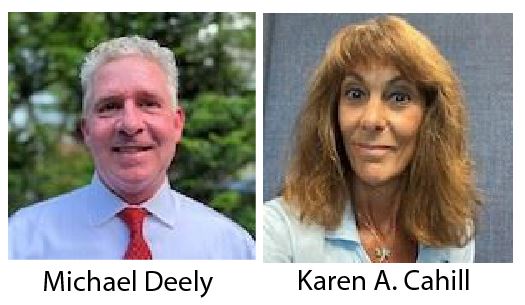By Steve Dwyer
Hoping to infuse a new level of perspective, ideas and vision into the BCONE organization, four new non-voting members were introduced during a summer board meeting.
Michael Deely, Manager of the Hazardous Discharge Site Remediation Fund (HDSRF) program and the Petroleum UST Fund program at New Jersey Economic Development Authority (NJEDA), was announced as non-voting member within the Regulatory committee. Joining Deely is Karen A. Cahill, Environmental Engineer with NYSDEC’s Division of Environmental Remediation in the Department’s Region 7 office in Syracuse, N.Y.
Meantime, Maria Coler and Dr. Nefeli Bompoti were appointed as non-voting members on the Education and Scholarship Committee, which Coler chairs.
Coler is an LSRP, an alumna of the Goldman Sachs 10,000 Small Businesses program, and founder of HCI, a 100% women-owned environmental consulting firm specializing in the remediation of brownfield sites in urban centers. Coler founded BCONE’s Brownfields, Books, and Brew club while serving as the chair of the BCONE Scholarship committee, which is now the Education and Scholarship Committee.
Bompoti, Ph.D., is assistant research professor, CT Brownfields Initiative, Dept. of Civil & Environmental Engineering at UCONN, who oversees the program along with fellow professor Marisa Chrysochoou, Ph.D., director, Connecticut Brownfields Initiative, Department of Civil and Environmental Engineering.
It has been under Bompoti’s instruction that has led to the selection of annual recipients at UCONN for the Charlie Bartsch Brownfield Scholarship program.
Regulatory Member Profiles

Deely had previously spent 18 years at NJDEP overseeing the HDSRF program and redevelopment projects in the Office of Brownfield and Community Revitalization.
Cahill has been with the NYSDEC’s Division of Environmental Remediation since 2004, primarily responsible for managing investigation and remediation of contaminated sites under the NYS Brownfield Cleanup and State Superfund Programs. She also has expertise in petroleum spill response, field analytical procedures, and soil vapor intrusion.
Comments Deely: “I have been a BCONE member for years but not a truly active member. I have tried to stay connected on what is going on in BCONE, attend sustainability workshops, and more.”
NJEDA is tasked with growing the state’s economy and increases equitable access to opportunity by supporting high-quality job creation, catalyzing investment, and fostering vibrant, inclusive community development.
NJEDA works in partnership with a diverse range of stakeholders to implement programs and initiatives that improve quality of life, enhance economic vitality and strengthen the state’s long-term economic competitiveness.
It operates within a vision to make New Jersey a national model for sustainable and equitable economic growth by investing in communities, fostering innovation, and supporting industries with high quality-jobs in the state.
Deely, who boasts a technical background and degree from Purdue University, had worked in the private sector for several years, performing brownfield work. In the public sector, he managed the state grant program around assessment, investigation and cleanup efforts.
Deely has worked with many private companies in New Jersey around cultivating the gold standard in brownfield development. One goal of his within the department is right-sizing the allocation of funds so money allocated fits what recipients require to move the needle forward. He also is eager to make sure that funds don’t go unused.
He cited a major success story this year in Camden, N.J. regarding the Cramer Hill Waterfront Park project, which was awarded the 2022 US EPA Region 2 Phoenix Award. The project has transformed the 86-acre Harrison Avenue landfill, one of the most high-profile brownfields sites in Camden, into a waterfront park and community center. One feature: more than 375,000 plants, shrubs and trees were installed throughout the park.
NJEDA, in partnership with the NJDEP, provided more than $26 million HDSRF to the Cramer Hill Waterfront Brownfield Development Area.
As Deely looks ahead to his BCONE service obligation this year and into next, he’s eager to be “in an information-gathering process with a lot of idea exchange.”
Cahill joined BCONE in late August as a regulatory board member. “A colleague emailed me in July asking me if I would be interested in joining the board. Prior to that, I was not familiar with BCONE,” she says.
Taking into account her accomplished career as an environmental engineer with NYS DEC, Cahill spoke about how she envisions using this experience to effect positive impacts for the BCONE Regulatory committee this year and into ’23—all to move the needle on brownfield execution.
“I am hopeful that I can bring a fresh perspective from the technical side of these projects, including emerging contaminant investigation, soil vapor intrusion and PCB investigation/cleanup,” she says. “A wish list to effect change would be more streamlined approach to satisfy TSCA requirements (EPA R2) and investigation/cleanup of PCB impacted sites.”
Looking at her achievements in New York state over the past year in regards to environmental remediation execution—ones that enable her to bring a unique vision to the committee—Cahill says she’s still waiting to determine the specifics around that. “The NYSDEC Division of Environmental Remediation conference is being held in Lake George [Nov. 8-10], so I’ll have more of a specific plan at that time.”
After speaking to Deely, Cahill says that “working specifically with Mike can create a synergy between his current economic redevelopment experience [he is also experienced within the environmental sector] and my environmental experience.” Deely and Cahill join environmental regulators and economic development specialists from CT, DE, MA, MD and PA on the BCONE Regulatory Committee. Other state-specific brownfield associations praise BCONE’s regional dialogue among regulators from multiple states. The exchange of program and policy ideas across state lines has always been one of the hallmarks of BCONE.
“Overcoming stumbling blocks to progress on these sites, including financial assurance, community acceptance, eligibility, remedy implementation concurrent with development and attracting developers to take on investigation/remediation of these sites,” are the end goals that Cahill lists on her front burner.
Editor’s note: Stay tuned for Part II in the series when we speak to both Maria Coler and Nefeli Bompoti.
Posted September 29, 2022

